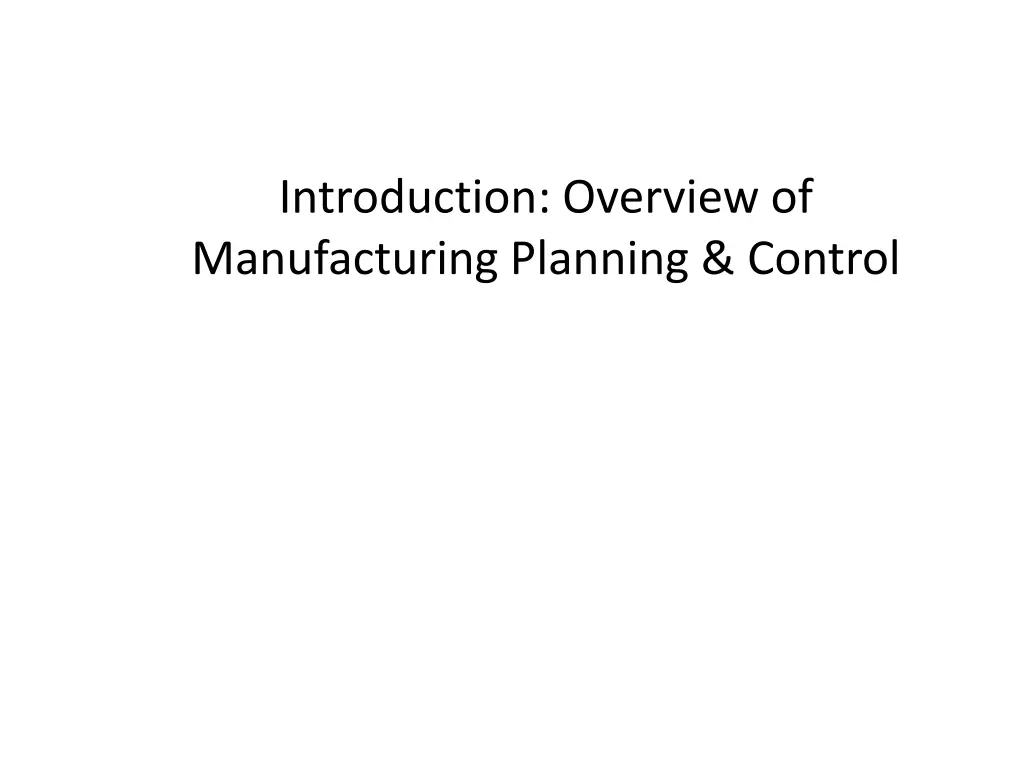
Enhancing Competitiveness Through Manufacturing Planning & Control
Explore the importance of Manufacturing Planning & Control (MPC) in improving cost, quality, lead time, flexibility, and services. Understand how MPC system framework aligns production with strategic planning for enhanced efficiency.
Download Presentation

Please find below an Image/Link to download the presentation.
The content on the website is provided AS IS for your information and personal use only. It may not be sold, licensed, or shared on other websites without obtaining consent from the author. If you encounter any issues during the download, it is possible that the publisher has removed the file from their server.
You are allowed to download the files provided on this website for personal or commercial use, subject to the condition that they are used lawfully. All files are the property of their respective owners.
The content on the website is provided AS IS for your information and personal use only. It may not be sold, licensed, or shared on other websites without obtaining consent from the author.
E N D
Presentation Transcript
Introduction: Overview of Manufacturing Planning & Control
MPC System Defined MPC system provides information to efficiently manage the flow of materials, effectively utilize people and equipment, coordinate internal activities with those of suppliers, and communicate with customers about market requirements. (VBW, 2)
Typical MPC Support Tasks Capacity requirements and availability Facility/equipment utilization Material planning Inventory control Production planning Production scheduling
Typical MPC Support Tasks (Continued) Production activity control (tracking) Supply chain planning and communication Meet customer requirements Respond to errors and problems Provide and share information with other functions
Why MPC? Improve competitiveness in cost, quality, lead time, flexibility, and services by reducing the organizational slacks in terms of resource utilization and customer requirements.
MPC System Framework Overall direction for MPC links production with engineering, marketing, and finance through the firm s strategic planning. Three MPC phases: 1. Creating the overall production plan. 2. Performing the detailed planning of material and capacity needs. 3. Executing these plans.
MPC SYSTEM (VBW, Figure 1.1) Resource planning Production planning Demand management Master production scheduling Front end Detailed capacity planning Detailed material planning Material and capacity plans Engine Shop-floor systems Vendor systems Back end
MPC Classification Schema Business Strategy MPC system design The complexity of the product as expressed in the number of sub-parts The repetitive nature of production See Figure 1.2
Business Strategy Cost Differentiation quality (design, conformance, service), flexibility (product, process, volume), time, Focus (cost or differentiation)
Production Systems Inventory Policy make-to-stock, make-to- order, assemble-to-order Process Type continuous (flow shop), repetitive (batch), intermittent (job shop), cellular, project
Concluding Principles MPC systems should support the firm s strategy and tactics. Different manufacturing processes often dictate the need for different designs of the MPC system. An effective MPC system can contribute to competitive position by lowering costs and providing better response to the market.
Concluding Principles (VBW, 11) All three phases of the MPC framework must be performed, but specific applications must reflect a company s characteristics and objectives. The MPC system s design will vary, depending on the distinctive needs of the firm and the current state of its MPC system. The system should evolve to meet changing requirements in the market, technology, products, and manufacturing processes.
Professional Organizations The Educational Society for Resource Management (American Production & Inventory Control Society) www.apics.org Institute for Supply Management www.ism.ws The Production and Operations Management Society www.poms.org
APICS Professional Certification Certified in Production & Inventory Management (CPIM) Five exam modules (Basic of Supply Chain Management, Master Planning of Resources, Detailed Scheduling and Planning, Execution and Control of Operations, Strategic Management of Resources) Requires certification maintenance
APICS Professional Certification Certified in Integrated Resource Management (CIRM) Five exam modules (Enterprise Concepts and Fundamentals, Identifying and Creating Demand, Designing Products and Processes, Delivering Products and Services, Integrated Enterprise Management)
